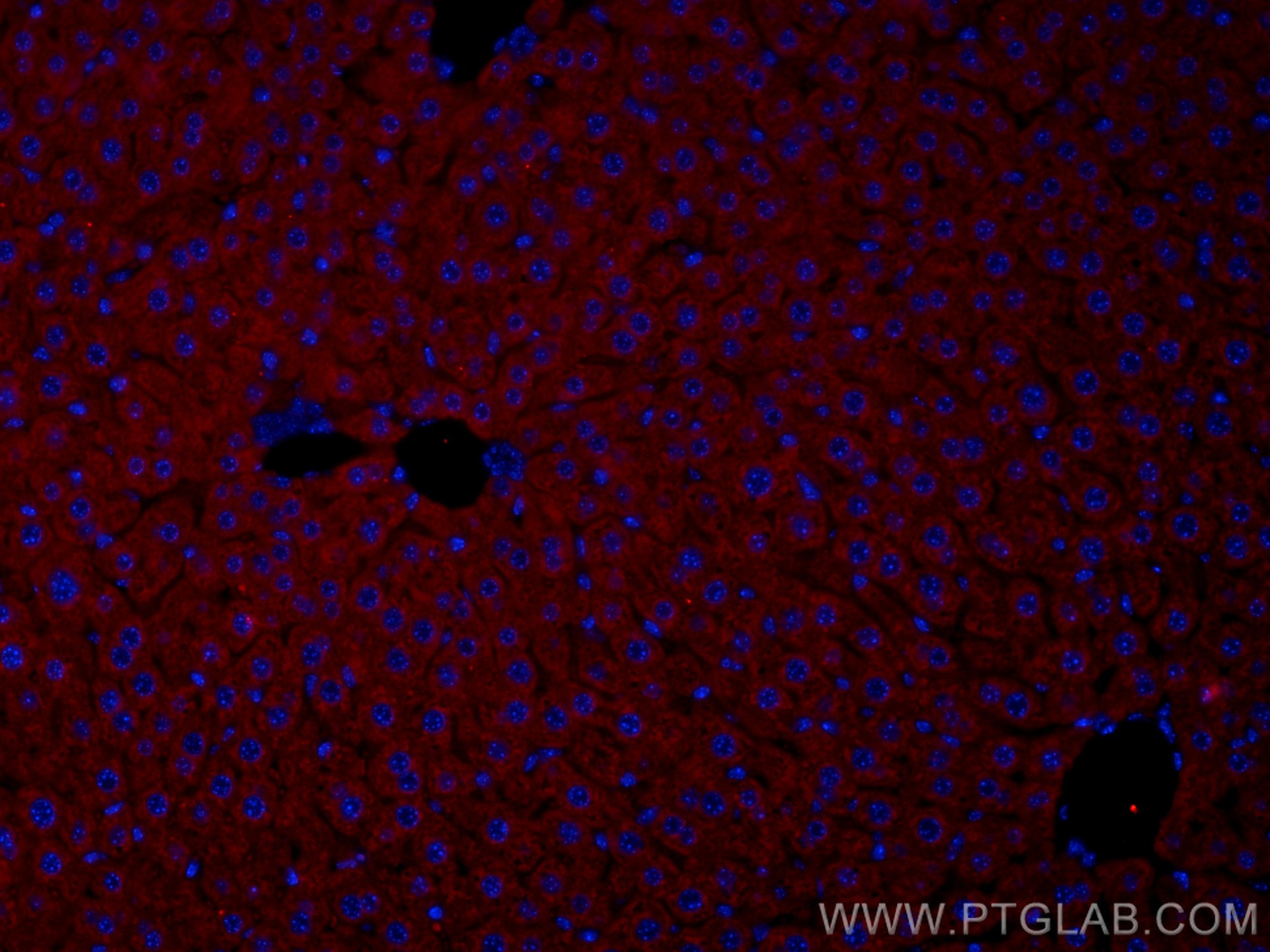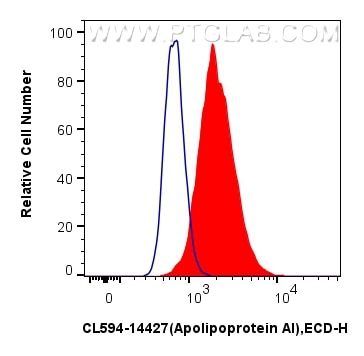- Featured Product
- KD/KO Validated
Apolipoprotein AI Polyklonaler Antikörper
Apolipoprotein AI Polyklonal Antikörper für IF-P, FC (Intra)
Wirt / Isotyp
Kaninchen / IgG
Getestete Reaktivität
human, Maus
Anwendung
IF-P, FC (Intra)
Konjugation
CoraLite®594 Fluorescent Dye
Kat-Nr. : CL594-14427
Synonyme
Geprüfte Anwendungen
| Erfolgreiche Detektion in IF-P | Mauslebergewebe |
| Erfolgreiche Detektion in FC (Intra) | HepG2-Zellen |
| Erfolgreiche Detektion in FC | HepG2-Zellen |
Empfohlene Verdünnung
| Anwendung | Verdünnung |
|---|---|
| Immunfluoreszenz (IF)-P | IF-P : 1:50-1:500 |
| Durchflusszytometrie (FC) (INTRA) | FC (INTRA) : 0.40 ug per 10^6 cells in a 100 µl suspension |
| Durchflusszytometrie (FC) | FC : 0.40 ug per 10^6 cells in a 100 µl suspension |
| It is recommended that this reagent should be titrated in each testing system to obtain optimal results. | |
| Sample-dependent, check data in validation data gallery | |
Produktinformation
CL594-14427 bindet in IF-P, FC (Intra) Apolipoprotein AI und zeigt Reaktivität mit human, Maus
| Getestete Reaktivität | human, Maus |
| Wirt / Isotyp | Kaninchen / IgG |
| Klonalität | Polyklonal |
| Typ | Antikörper |
| Immunogen | Apolipoprotein AI fusion protein Ag5793 |
| Vollständiger Name | apolipoprotein A-I |
| Berechnetes Molekulargewicht | 31 kDa |
| Beobachtetes Molekulargewicht | 26-30 kDa |
| GenBank-Zugangsnummer | BC005380 |
| Gene symbol | APOA1 |
| Gene ID (NCBI) | 335 |
| Konjugation | CoraLite®594 Fluorescent Dye |
| Excitation/Emission maxima wavelengths | 588 nm / 604 nm |
| Form | Liquid |
| Reinigungsmethode | Antigen-Affinitätsreinigung |
| Lagerungspuffer | PBS with 50% glycerol, 0.05% Proclin300, 0.5% BSA |
| Lagerungsbedingungen | Bei -20°C lagern. Vor Licht schützen. Nach dem Versand ein Jahr stabil. Aliquotieren ist bei -20oC Lagerung nicht notwendig. 20ul Größen enthalten 0,1% BSA. |
Hintergrundinformationen
ApoA1 is a major protein component of high density lipoproteins (HDL) which is associated with reversed cholesterol transport, lipid/cholesterol binding, lecithin/cholesterol acyltransferase (LCAT) activation and specific receptors binding. It is synthesized in the liver and small intestine. Defects of ApoA1 cause low HDL level and systemic non-neuropathic amyloidosis. Serum concentration of ApoA1 is inversely related to the risk of developing atherosclerosis. This antibody was generated against the C-terminal region of human ApoA1.
Protokolle
| PRODUKTSPEZIFISCHE PROTOKOLLE | |
|---|---|
| IF protocol for CL594 Apolipoprotein AI antibody CL594-14427 | Protokoll herunterladen |
| FC protocol for CL594 Apolipoprotein AI antibody CL594-14427 | Download protocol |
| STANDARD-PROTOKOLLE | |
|---|---|
| Klicken Sie hier, um unsere Standardprotokolle anzuzeigen |



